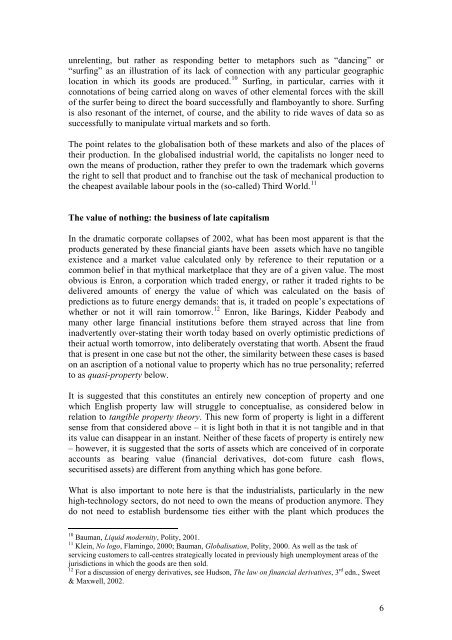The Unbearable Lightness of Property - alastairhudson.com
The Unbearable Lightness of Property - alastairhudson.com
The Unbearable Lightness of Property - alastairhudson.com
You also want an ePaper? Increase the reach of your titles
YUMPU automatically turns print PDFs into web optimized ePapers that Google loves.
unrelenting, but rather as responding better to metaphors such as “dancing” or<br />
“surfing” as an illustration <strong>of</strong> its lack <strong>of</strong> connection with any particular geographic<br />
location in which its goods are produced. 10 Surfing, in particular, carries with it<br />
connotations <strong>of</strong> being carried along on waves <strong>of</strong> other elemental forces with the skill<br />
<strong>of</strong> the surfer being to direct the board successfully and flamboyantly to shore. Surfing<br />
is also resonant <strong>of</strong> the internet, <strong>of</strong> course, and the ability to ride waves <strong>of</strong> data so as<br />
successfully to manipulate virtual markets and so forth.<br />
<strong>The</strong> point relates to the globalisation both <strong>of</strong> these markets and also <strong>of</strong> the places <strong>of</strong><br />
their production. In the globalised industrial world, the capitalists no longer need to<br />
own the means <strong>of</strong> production, rather they prefer to own the trademark which governs<br />
the right to sell that product and to franchise out the task <strong>of</strong> mechanical production to<br />
the cheapest available labour pools in the (so-called) Third World. 11<br />
<strong>The</strong> value <strong>of</strong> nothing: the business <strong>of</strong> late capitalism<br />
In the dramatic corporate collapses <strong>of</strong> 2002, what has been most apparent is that the<br />
products generated by these financial giants have been assets which have no tangible<br />
existence and a market value calculated only by reference to their reputation or a<br />
<strong>com</strong>mon belief in that mythical marketplace that they are <strong>of</strong> a given value. <strong>The</strong> most<br />
obvious is Enron, a corporation which traded energy, or rather it traded rights to be<br />
delivered amounts <strong>of</strong> energy the value <strong>of</strong> which was calculated on the basis <strong>of</strong><br />
predictions as to future energy demands: that is, it traded on people’s expectations <strong>of</strong><br />
whether or not it will rain tomorrow. 12 Enron, like Barings, Kidder Peabody and<br />
many other large financial institutions before them strayed across that line from<br />
inadvertently over-stating their worth today based on overly optimistic predictions <strong>of</strong><br />
their actual worth tomorrow, into deliberately overstating that worth. Absent the fraud<br />
that is present in one case but not the other, the similarity between these cases is based<br />
on an ascription <strong>of</strong> a notional value to property which has no true personality; referred<br />
to as quasi-property below.<br />
It is suggested that this constitutes an entirely new conception <strong>of</strong> property and one<br />
which English property law will struggle to conceptualise, as considered below in<br />
relation to tangible property theory. This new form <strong>of</strong> property is light in a different<br />
sense from that considered above – it is light both in that it is not tangible and in that<br />
its value can disappear in an instant. Neither <strong>of</strong> these facets <strong>of</strong> property is entirely new<br />
– however, it is suggested that the sorts <strong>of</strong> assets which are conceived <strong>of</strong> in corporate<br />
accounts as bearing value (financial derivatives, dot-<strong>com</strong> future cash flows,<br />
securitised assets) are different from anything which has gone before.<br />
What is also important to note here is that the industrialists, particularly in the new<br />
high-technology sectors, do not need to own the means <strong>of</strong> production anymore. <strong>The</strong>y<br />
do not need to establish burdensome ties either with the plant which produces the<br />
10 Bauman, Liquid modernity, Polity, 2001.<br />
11 Klein, No logo, Flamingo, 2000; Bauman, Globalisation, Polity, 2000. As well as the task <strong>of</strong><br />
servicing customers to call-centres strategically located in previously high unemployment areas <strong>of</strong> the<br />
jurisdictions in which the goods are then sold.<br />
12 For a discussion <strong>of</strong> energy derivatives, see Hudson, <strong>The</strong> law on financial derivatives, 3 rd edn., Sweet<br />
& Maxwell, 2002.<br />
6













